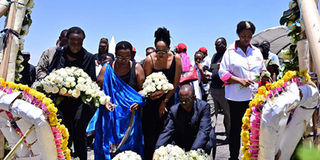Some families reject Boeing compensation for dead kin

Families of victims from Kenya and Rwanda lay flowers on March 15, 2019, as they visit the crash site at Hama Quntushele village in Oromia. Lawyer Adam Ramji says families, mostly drawn from Ethiopia, have rejected Boeing's cash compensation citing cultural beliefs. FILE PHOTO | TONY KARUMBA | AFP
What you need to know:
- Lawyer Adam Ramji says families, mostly drawn from Ethiopia, have been citing cultural beliefs.
- The families have refused to participate in pressing for financial compensation from Boeing after losing loved ones in the March 10 crash.
- Boeing operationalised a $50 million (Sh 5.1 billion) fund for “immediate financial assistance to families” of Indonesia and Ethiopia crashes involving Boeing planes.
- Lawyer Irungu Kang’ata, who is in a partnership of four law firms that are representing 15 families, asked the kin of those who perished to accept the “gift” from Boeing.
Some of the families that lost loved ones in the March 10 crash of an Ethiopian Airlines plane have refused to participate in pressing for financial compensation from Boeing.
Lawyer Adam Ramji says these families, mostly drawn from Ethiopia, have been citing cultural beliefs.
“I am shocked when I hear families say, ‘Our traditions tell us not to accept money for a lost family member,’” said Mr Ramji, who is based in the United States and has visited several affected families in Kenya and Ethiopia.
The accident, which left 157 people dead, claimed the lives of 32 Kenyans, nine Ethiopians and eight Americans among other nationalities.
“I tell these families that accepting money is the way we punish a big company. If you file your claim, you can prevent future disasters. If you don’t want the money, give it away, create a charity, create a scholarship, build a library. Think: If your lost love one could talk to you, what would they want you to do?” posed Mr Ramji, who is representing three Kenyan families.
Boeing, the US-based aircraft maker, intends to pay around $144,500 (Sh15 million) for each life lost in the crash.
The company announced on Monday that it had operationalised a $50 million (Sh 5.1 billion) fund for “immediate financial assistance to families” of those who perished in accidents involving Boeing planes in Indonesia (October 2018) and Ethiopia (March 2019).
BOEING FUND
“The $50 million Boeing Financial Assistance Fund represents the initial expenditure of a $100 million pledge by Boeing to address family and community needs of those affected by the tragedies,” Boeing said in a statement.
Families have until December 31 to apply for the fund.
Lawyer Irungu Kang’ata, who is in a partnership of four law firms that are representing 15 families, asked the kin of those who perished to accept the “gift” from Boeing.
He, however, demanded that Boeing discloses how it will disburse the money.
“So far the information remains hazy,” he said.
He also observed that the objective of a suit they have filed in the US in partnership with Friedman Rubin, an American law firm, is “not money but rather justice and ensuring Boeing corrects its error”.
Mr Ramji also welcomed the offer from Boeing, calling it “only an appetiser of what is to come”.
“Families have lost a lot; that’s obvious. But I believe Boeing’s allocation of $50 million is a gesture of goodwill,” he said.
DENIED LIABILITY
Meanwhile, Boeing has filed an initial defence against a lawsuit filed regarding the March 10 crash.
In the response seen by the Sunday Nation, Boeing denies claims that its controversial Maneuvering Characteristics Augmentation System (MCAS) system was the fault that caused the March 10 crash.
“Boeing denies the plaintiffs’ allegations of negligence, negligent product liability,” it says. “The damages were proximately caused by the acts or omissions of others over whom Boeing had no control or right to control.”
The firm goes ahead to list a set of instructions it sent to those operating the 737 Max 8 plane — which has since been grounded — after the Indonesia crash. The instructions detail the procedures a pilot should take to take charge of a plane’s flying angle. Initial investigations show that the MCAS was at fault for the two crashes, as it caused a scenario where the pilot could not take charge of an aeroplane.
Boeing also says that all those suing it are invited to engage in “direct settlement negotiations to resolve these matters”.





